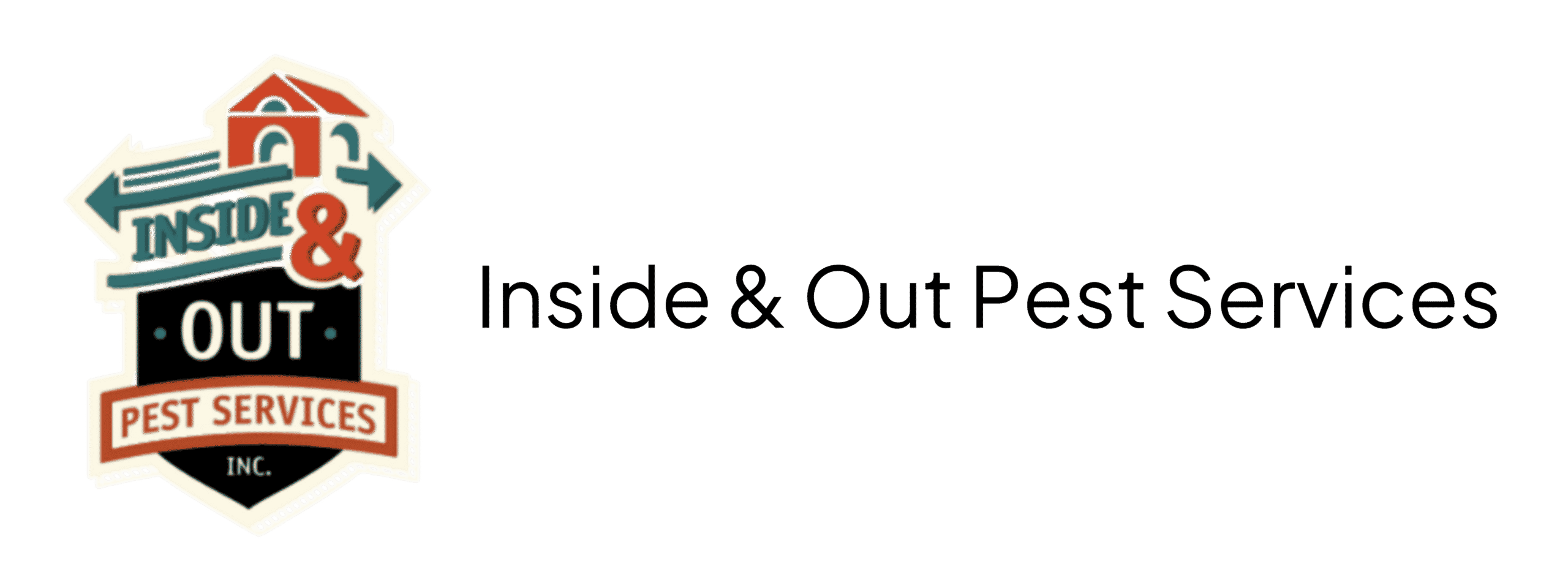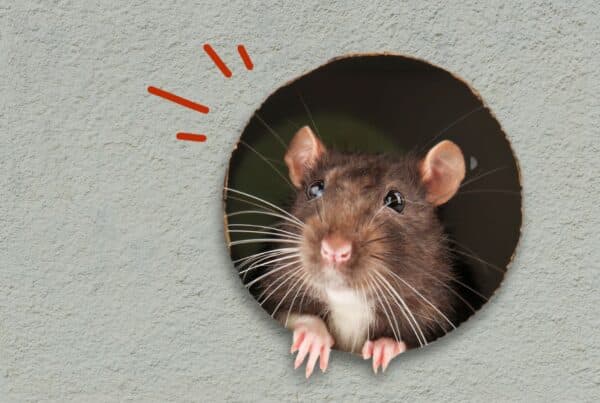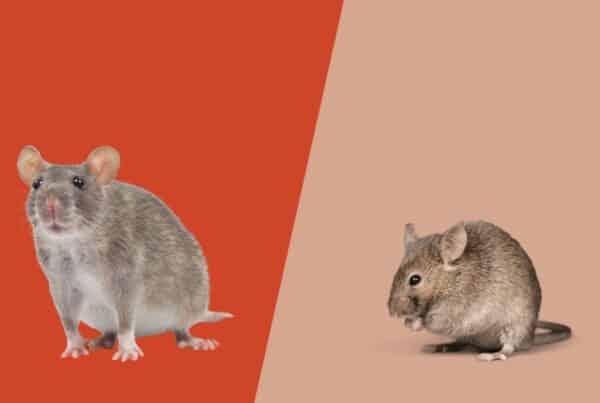Hearing scratching in your walls or finding small droppings under the sink is more than unsettling. It usually means rodents have found a way inside. That’s where rodent exclusion comes in.
Many homeowners turn to traps or poison, but these methods often handle only a small part of the problem. True rodent control starts with prevention, not cleanup.
Instead of waiting for rodents to appear, exclusion focuses on sealing your home to stop them from getting in at all. It’s safer, cleaner, and far more effective than chasing them after the fact.
Here’s how it works, why it matters, and how homeowners can keep their homes protected all year.
What Is Rodent Exclusion?
Rodent exclusion is a professional pest control process that identifies and seals entry points where rodents could enter your home.
It focuses on prevention rather than elimination. Once an exclusion service is complete, your home is protected from future invasions instead of just reacting to the current one.
It’s estimated that rodents contaminate about 20 percent of the world’s food supply each year, mostly through droppings and urine.
Their ability to squeeze through openings as small as a dime makes even well-maintained homes vulnerable.
The goal of exclusion is simple: find every possible opening, seal it with chew-proof materials, and make sure your home no longer offers easy access to food or shelter.
Why Florida Homes Need Rodent Exclusion
Jacksonville’s warm and humid climate attracts pests year-round, and rodents are no exception. The city’s mix of historic neighborhoods, waterfront homes, and heavy vegetation gives mice and rats plenty of nesting areas.
Common species in this region include:
- Roof rats, often nesting in attics or palm trees
- Norway rats, which prefer sewers and ground-level areas
- House mice, small but persistent invaders that live close to food sources
Rodents enter homes for two reasons: warmth and food. Once inside, they can quickly multiply. The CDC warns that rodents can spread over 35 diseases through contact with droppings, saliva, or parasites they carry.
They can also cause expensive property damage by chewing insulation, electrical wiring, and plumbing lines.
For Jacksonville homeowners, rodent exclusion isn’t just about comfort. It’s about protecting the structure and health of your home.
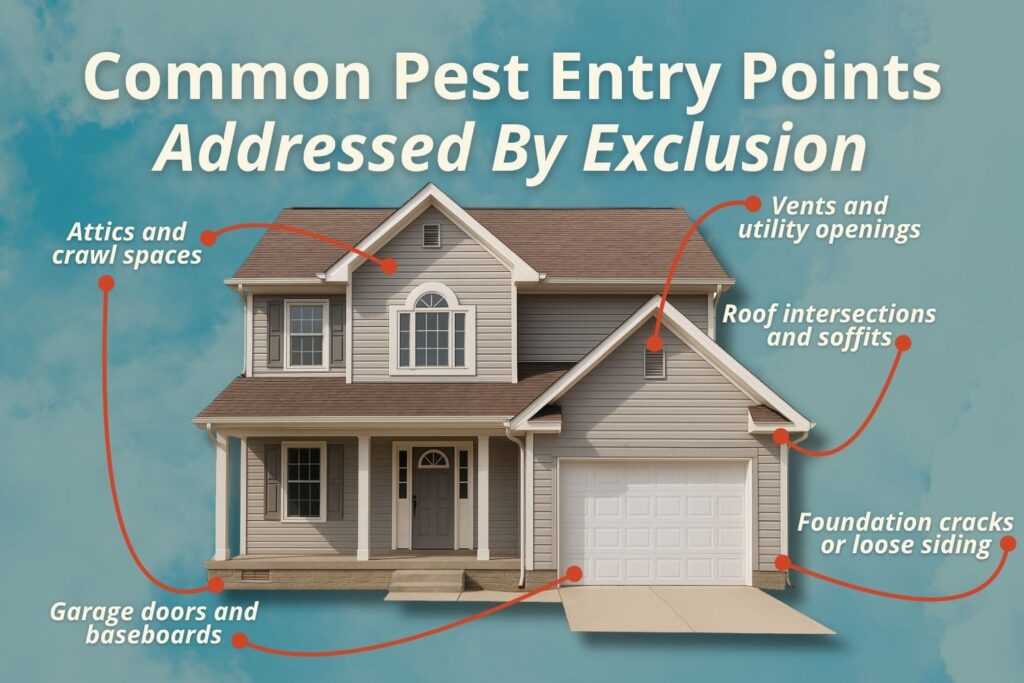
Step 1: A Full Inspection of Your Home
Every successful rodent exclusion begins with a detailed inspection. Professionals from Inside & Out Pest Services start by examining your property from top to bottom, searching for potential access points, nesting materials, or other signs of activity.
They’ll focus on areas like:
- Attics and crawl spaces
- Air vents and utility openings
- Roof intersections and soffits
- Foundation cracks or loose siding
- Garage doors and baseboards
Even a quarter-inch gap under a door can allow a mouse to squeeze through. During inspection, technicians also check for what’s attracting rodents, such as unsecured pet food, overflowing trash bins, or cluttered storage areas.
A clear, illustrated visual could show a home diagram labeling common entry points like vents, crawl spaces, and roof edges.
Step 2: Sealing Entry Points with Durable Materials
Once entry points are identified, the real exclusion work begins. This step involves sealing holes, cracks, and crevices using materials strong enough to resist gnawing.
Common materials used include:
- Galvanized steel mesh or hardware cloth
- Heavy-gauge metal flashing for roof and wall gaps
- Pest-rated expanding foam or silicone sealant
- Concrete patches for foundation voids
- Weatherstripping around doors and windows
Rodents can chew through wood, vinyl, and even soft metal. That’s why professional-grade exclusion materials are key. Homeowners who rely on spray foam or steel wool alone often find that rodents return within weeks.
Each home is different, so technicians choose materials based on construction type, environment, and level of infestation.
Step 3: Sanitation and Scent Removal
Rodents leave behind droppings, urine, and pheromone trails that attract new intruders. Even after sealing entry points, these scents can bring others back.
After exclusion repairs, Inside & Out Pest Services cleans and disinfects affected areas to eliminate odors and contamination.
his might include vacuuming droppings, removing insulation, and using commercial-grade disinfectants approved by the Florida Department of Health.
Sanitation serves two purposes. It removes health hazards and erases scent markers that would otherwise invite new rodents to investigate. This step is especially important in kitchens, attics, and basements where rodents tend to nest.
Step 4: Trapping and Monitoring for Remaining Rodents
If an active infestation is still present during the exclusion process, humane traps are set to remove any rodents still inside. This ensures that no animals remain sealed indoors once entry points are closed.
Traps are typically checked daily until activity stops. For severe infestations, professionals might use remote or smart monitoring systems that alert technicians to new movement.
Once the interior is clear, follow-up monitoring helps confirm the home remains rodent-free. Inside & Out Pest Services typically recommends a recheck after several weeks to ensure no new access points have formed.
Step 5: Preventive Maintenance
Exclusion only works long-term when homeowners maintain the barriers put in place. Simple home habits go a long way toward keeping rodents from returning.
Here’s what helps most:
- Keep food stored in sealed containers, including pet food.
- Regularly clean behind stoves, refrigerators, and cabinets.
- Trim shrubs and tree branches that touch your home’s roofline.
- Inspect your attic or crawl space after major storms.
- Repair any loose weatherstripping or foundation cracks promptly.
Rodent exclusion is an investment that lasts, but like any part of home maintenance, it works best with occasional upkeep.
Rodent Exclusion vs. Traditional Pest Control Methods
Other options have their place, but they often offer temporary relief. Exclusion addresses the root cause, which is access.
| Method | Goal | Short-Term Results | Long-Term Effectiveness |
| Trapping | Capture rodents currently inside | Effective for small infestations | Limited; rodents return if openings remain |
| Baiting | Reduce visible population | Works quickly but risky for pets and wildlife | Requires repeated applications |
| Exclusion | Block all entry routes | May take longer initially | Permanent solution with proper maintenance |
Professional exclusion provides the best long-term outcome because it prevents rodents from entering in the first place.
The NPMA calls exclusion “the cornerstone of effective rodent management.”
How Rodent Exclusion Protects Your Health and Home
Rodent exclusion is about more than just avoiding an unpleasant surprise in the pantry. It actively protects your home’s structure and your family’s health.
Health and safety benefits include:
- Lower risk of disease exposure from droppings or urine
- Reduced allergens and airborne particles in living areas
- Protection against fire hazards caused by chewed wires
- Cleaner insulation and ductwork
- Fewer parasites like fleas or mites that ride in on rodents
The CDC links rodent infestations to several diseases, including hantavirus and salmonella, both of which can spread in enclosed spaces.
By removing points of entry, exclusion cuts off the source before it becomes a larger health issue.
How Long Does Rodent Exclusion Last?
A professionally completed rodent exclusion can last for years when properly maintained. The lifespan depends on environmental factors and home condition.
For example:
- Homes near wooded areas or water may need more frequent checks.
- Older homes may require reinforcement after structural shifts or repairs.
- Newer homes can stay secure for years with minimal maintenance.
Inside & Out Pest Services often schedules periodic inspections for customers in Jacksonville to ensure seals, mesh, and flashing remain intact.
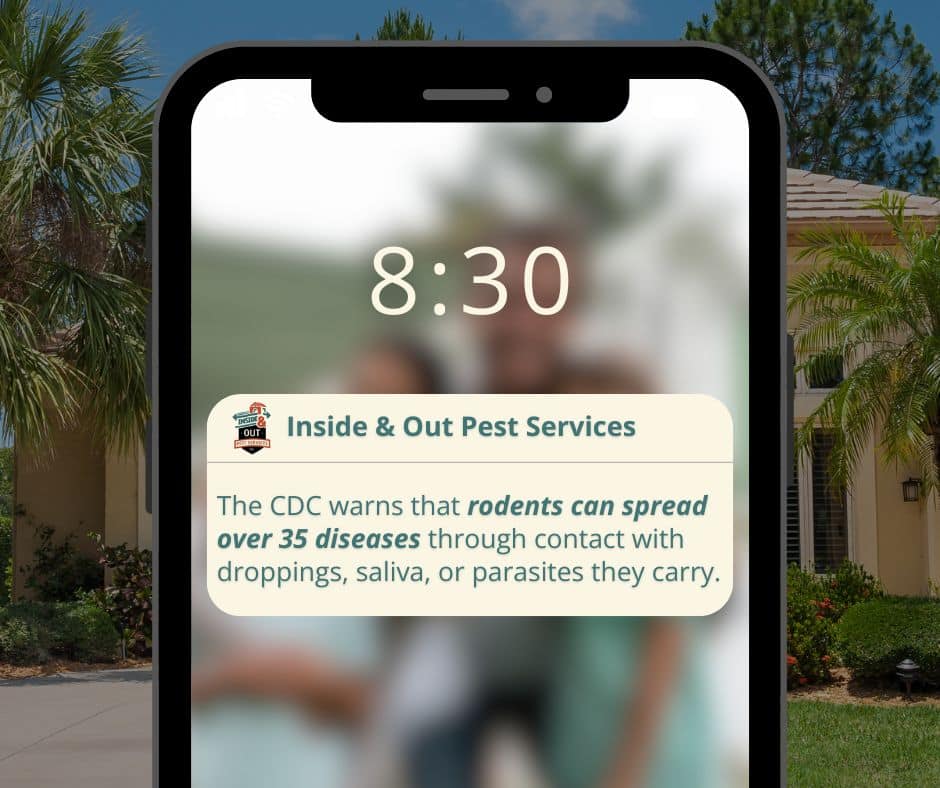
Signs You May Need Rodent Exclusion
Rodents are stealthy and rarely appear in plain sight during the day. Recognizing early warning signs helps stop an infestation before it grows.
Look for:
- Small black droppings under sinks or along walls
- Scratching or rustling at night in walls or ceilings
- Gnaw marks on wires, pipes, or furniture
- Oily smudges where rodents travel repeatedly
- Nesting materials like shredded paper or fabric
- Strange odors in closed-off areas like attics or crawl spaces
Even a few signs are enough reason to schedule an inspection. A professional will determine whether exclusion, trapping, or both are needed.
Other Times to Call a Pest Professional
Rodents aren’t the only pests that can threaten your home. Inside & Out Pest Services also helps homeowners handle other seasonal and structural pest problems common in the Jacksonville area.
You may want to schedule a visit if:
- You’ve noticed ants or roaches in kitchens or bathrooms
- Termite swarmers are appearing near windows or doors
- You’re hearing noises in the attic that could indicate squirrels or raccoons
- Mosquitoes or fleas are becoming a recurring issue in your yard
- You’ve spotted spider webs or wasp nests around the exterior
Inside & Out Pest Services provides complete pest management for homes across Jacksonville and nearby communities.
From rodent exclusion to general pest prevention and wildlife control, their experts can inspect, identify, and eliminate the issue before it causes damage or stress.
Other Related Questions
What’s the difference between rodent control and rodent exclusion?
Rodent control focuses on removing an existing infestation, while rodent exclusion prevents new ones from forming. Both are important, but exclusion gives long-term protection against future problems.
How can I tell if my home needs attic restoration after a rodent problem?
If insulation looks chewed, flattened, or contaminated with droppings, it may need replacement. Professional cleaning and sealing keep odors and bacteria from spreading through your air system.
Are there signs of other pests I should look for around the same time?
Yes. Homeowners who notice rodents often find roaches, ants, spiders, or other pests nearby because they share food and moisture sources. Seeing one type of pest is a good reason to schedule a full inspection.
What pest services work best for Jacksonville homeowners year-round?
Seasonal pest control keeps problems from building up between visits. Many homeowners in the Jacksonville area pair rodent exclusion with quarterly pest treatments to manage roaches, mosquitoes, and ants throughout the year.
Conclusion
Rodent exclusion is one of the smartest, most lasting forms of pest prevention for Jacksonville homeowners. Rather than chasing rodents after they move in, exclusion keeps them from entering in the first place.
With expert inspection, sealing, cleaning, and maintenance, Inside & Out Pest Services helps local families stay safe, sanitary, and rodent-free year-round.
If you’ve noticed signs of activity or want to prevent future infestations, schedule professional service today and protect your home for the long term.
